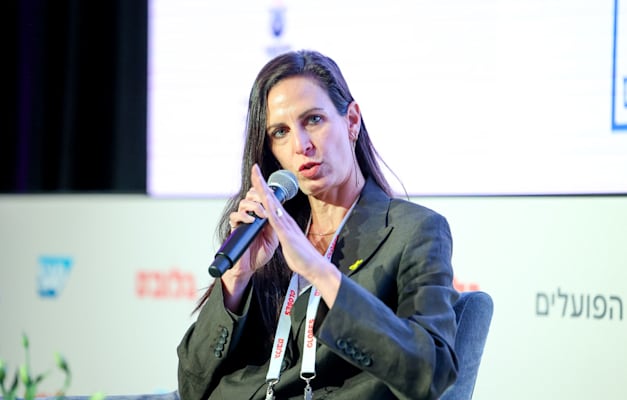In the future, investing will no longer be a matter of sticking to some stock index or other, the 'fire and forget' method; it will be necessary to be actively involved and identify trends. That’s the assessment of Anath Levin, head of BlackRock Israel and among the most prominent figures in the Israeli financial world. Levin participated in a panel at the Globes' Israel Business Conference, moderated by "Globes" capital market editor Shai Shalev. The panel also included Liat Hazout, CEO of Hapoalim Equity, Bank Hapoalim, and Limor Beker, managing director of investment house Hamilton Lane in Israel.
We are at the end of an amazing year for investors. The Tel Aviv 35 index is up by 21%, and other leading stock indices have shot up. The price of Bitcoin has also jumped by 112% since the beginning of the year. Is it time to get out, or wait for the next downturn?
Levin: "You have to zoom out. When you take the long view and look outside, something has happened here since the Covid pandemic period until now. We are in a world where consumption means inflation. Governments will pay more on their debt. We also need to think about what growth will be like in the future, because the world is aging.
"We need to look at the structural trends that the world is going through, because this is a very important transformation. The aging population and the demographic shift changes not only economies, but also the political arena."

BlackRock Israel head Anath Levin at the Israel Business Conference credit: Shlomi Yosef
Levin added, "The real world is getting closer to the financial world. That's why at BlackRock we are pro-risk. When you look at the US today, you see that the consumer is strong, and that high interest rates did not cause a recession. Companies are strong and their profits are strong. In Europe, it's a different story - you have to look more closely at the debt. Investors must therefore be more tactical, because, looking ahead, you don't see all of the risks, because of the structural changes. If you try to understand what all the changes mean when looking ahead, you won't know which industry will be next to win in AI. You need to be in the markets right now and follow them. I say - manage risk."
Limor Beker of investment house Hamilton Lane, which specializes in private investment, notes, "We have the privilege of not trying to time the market. We are the largest private markets asset allocation firm in the world; all of which generates a database for us. Over the last 20 years, private markets have outperformed the tradable markets. The markets weren’t always at such record levels. It’s interesting to look at the period of the dot-com bubble of 2000 and the 2008 financial crisis. During those periods, the private investment markets demonstrated stability."
Liat Hazout of Hapoalim Equity stated, "As a long-term investor, I was taught not to time the market. On the other hand, you must look at trends and choose correctly from the micro. It’s true that we are at some sort of growth peak, but it is not for sure that this is the (last) peak. All the fundamentals that Anath mentioned create opportunities. There are many new sectors that will develop from the trends we are experiencing now. They will continue to grow, and create more and more opportunities. I believe we will continue to grow over time."

Liat Hazout, CEO of Hapoalim Equity, at the Israel Business Conference credit: Shlomi Yosef
Where do you identify the biggest market opportunities? What are the next trends?
Levin: "BlackRock is the largest investment management company in the world. ($11 trillion in assets under management.) We have the privilege of combining the tradable and non-tradable world. We know how to look at these two worlds and see what feeds them. Looking at the opportunities ahead, we must look at the big trends: geopolitics, the aging population, AI, which requires a huge amount of data centers and energy, net-zero carbon emissions, and the future of finance. All these trends converge in the infrastructure space.
"The infrastructure space is one that knows how to deal with the recurring uncertainty about future inflation. Today, inflation in the world is higher and sticky in part. We have growth that will probably be lower. That is why infrastructure will turn to the private market [over government investment. H.S.]. So, whether it's private investments or more marketable investments, infrastructure is important for both," explains Levin.
Beker: "There is a major trend of diverting money from the public to the private markets. 90% of the companies in the world are private, while only 10% of the capital raised is private. So, 10% of the money that is raised is chasing after 90% of the companies. This is the entry point for private investors into the private market sector. It was once the domain of institutions, with a high minimum investment threshold and other barriers. This domain was closed but today it’s open through evergreen funds. Private investors around the world are exposed to the best investments today. Israel has always been a little behind; in 2005, the investment institutions were not exposed to private markets but today they have a 25% allocation. Entities like ours do everything to make these areas accessible in Israel."
Hazout: "I estimate that after northern Israel stabilizes, there will be a great deal of physical rehabilitation here. The whole issue of infrastructure, which Anath touched on, and many residential real estate plans that have already been implemented. We have had a shortage for many, many years in this area; supply has failed to meet the demand. So, we believe there will be huge growth. Companies will benefit from this, which is why residential real estate is a super interesting field. When interest rates drop, income-producing real estate will also benefit. And of course, the defense industries, for which the war was a showcase. The whole world was looking at our technology and defense systems. It’s true that this universe is already priced high, but once there are arrangement agreements, and foreign investors return in significant numbers, we’ll see these sectors flourishing as well."
Investment portfolio management in a new world
Are there high-risk sectors that are overpriced? Bitcoin has more than doubled its value.
Levin: "It’s estimated that $75 trillion will be invested worldwide in infrastructure by 2030. Urbanization will also be a leading trend. What is needed is to understand how to manage an investment portfolio. Specific questions -- this rose, that jumped -- evade the question: how do you manage an investment portfolio in the new post-pandemic world, a world with a new regime and structural changes. We know that the old 60/40 division (60% bonds, 40% stocks) will no longer exist as a neutral portfolio in the future, because long-term bonds can no longer protect against declining shares. Governments around the world are raising a great deal of money today, and there is great danger 'at the long end of the bond curve' (that they will have difficulty paying off the debt, H.S.). That’s why we need to be more selective in choosing between sectors.
"Between 2016 and 2019, if you moved your investment portfolio between sectors, you earned another 30%. In the last three years, if you moved between sectors, you almost doubled the return. Today, investors are getting closer to the real world. And they need to think very carefully about the scenarios that will lie ahead. AI will change many industries, many things, some of which we don't know today."
Beker: "The influx to the S&P 500 began in 2023. Over NIS 200 billion from Israel has been invested in the index over the past two years. They have recorded phenomenal returns. But we must remember that this index was not always at record levels. There were periods of stagnation and declines. In 2010, for example, the index didn’t move. In 2022, it fell by 20%. It should be remembered that the Israelis are making dollar investments, and you need to diversify between many sectors and areas. The switch to only investing in the S&P 500 is very dangerous.
"There’s a big gap between the opportunities and investment channels for the private investor in the US and Europe, compared with those for the Israeli investor. Hamilton Lane in Israel is working to reduce this intolerable gap, by introducing investment tools and opening up options previously not available to the investor community in Israel - first and foremost, private market investments and within these, evergreen funds."
Levin: "We should ask, what is passive investment anyway? Today in the US there are passive-active investments. Passive and active are old names. Passive means there is supposedly a product that is constantly being traded on the stock exchange and you can always follow it. In the past, people followed a certain index. The new passive is activized and it chooses companies, for example from the Momentum index, and now you can follow them. You should also be active in choosing sectors. And also in which companies we invest.
"There’s drama in bonds. As mentioned, governments will have to raise a lot of money, and they are constantly offering an alternative of very high interest rates to investors. Precisely on tradable debt (corporate bonds) there are tight spreads (competition for the interest rate). The combination and the understanding of how the markets interact is the right way to go. You must be active. You can't ‘fire and forget’ anymore, and you can't sit on just one index."
How has the war affected investors’ willingness to return and invest here?
Hazout: "I mainly see the exits of the Israeli funds in which we’re invested. Certainly when there’s a settlement in the north, which we hope will be maintained, and we hope there will be a settlement in the south as well, we’ll see investors return to Israel. We saw in the distribution of Phoenix shares that a quarter of the buyers were foreign investors. There were several other exits this year. The foreign investors view us as a technological hub, and talk about Israeli talent. Even if the foreign investors took a step back, and rightly so, as far as they’re concerned, as soon as the geopolitical situation calms down, we’ll see them return to the technology sectors, and the defense sector will also be super interesting for them."
Beker: "We have invested over a billion dollars in Israeli companies, in companies located on the Gaza border, the Galilee, and in Israeli high-tech. The CEO of Hamilton Lane has been to Israel four times since the war began. We are here in times of peace and in times of war. The high-tech ecosystem is strong -- even stronger in wartime. We think that Israeli defense industries are strong, as well as high-tech and technology. These are the fastest growing sectors in the world. The end of the war -- I hope it will happen soon -- will give a tremendous boost to Israel's economy. There will also be many exits."
Levin: "We are here to stay."
The Globes Israel Business Conference is held in collaboration with Bank Hapoalim and The Phoenix Holdings, and is sponsored by El Al, Bezeq, Nespresso, Wolt, Dell, the Israel Medical Association, Energean, the Jewish National Fund, BlackRock, Playtika, Meta, Strauss Group, BAZAN Group, and MSCI, with the participation of Mekorot, The Port of Ashdod, and the Israel Innovation Authority.
Published by Globes, Israel business news - en.globes.co.il - on December 9, 2024.
© Copyright of Globes Publisher Itonut (1983) Ltd., 2024.